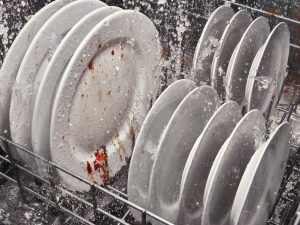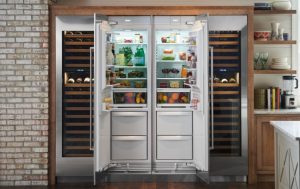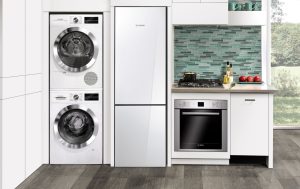Which Major Appliances Add Up to the Most Energy Usage in Your Home?

Many homeowners dread the arrival of their energy bills. The cost of energy seems to continually increase and it can be daunting to anticipate whether your bill will be higher or lower this month. While you may be aware that heating and cooling accounts for a large proportion of energy bills, you may not know which of your major appliances are contributing to those hefty bills. Here we’ll explore the four appliances that use the most energy and the ways you can boost their efficiency to lower your utility bills.
The Dishwasher:
According to Connect4Climate data, dishwasher’s only require approximately $49 of energy per year. While your dishwasher may not be using a lot of energy throughout the year, it can use lots of water.
There are a few ways to decrease your dishwasher water usage. The best way is to only run a cycle when the dishwasher is full. While some models have a half load program, it is more efficient to only run the dishwasher with a full load. This will also save on electricity and detergent costs.
If you switch to an Energy Star model, you can save gallons of water and energy each year. So, spending a little more initially on your new appliance can be well worth it in the long run.
Your Electric Oven or Range:
If you used your oven every day set at a 350ºf temperature, you would spend $90 a year on energy costs. So, if you use your oven more frequently, and typically at higher temperatures, you may need to make a few changes to conserve energy.
Try batch cooking meals, so your oven will not need to work harder every time you want to cook something. Batch cooking is efficient, as heating leftovers uses far less energy than cooking something from scratch.
You can also try to maximize your oven usage. So, if you’re heating up the oven to make dinner, why not put in a sheet of cookies or a cake, rather than waiting to bake them at a separate time.
Your Refrigerator:
Refrigerators use energy all of the time, so it is not possible to simply turn it off to save energy. This is a major appliance that always needs to be running to ensure it remains cool. Fortunately, there are some ways to ensure that your refrigerator is operating as energy efficiently as possible.
Firstly, check your temperature settings. There is no need to have your refrigerator cranked to full. In fact, this may result in items getting frost damage and spoiling. The optimum refrigerator temperature is 40ºf, so if you’re unsure about your appliance, try using a thermometer to check the temp.
Another way to boost energy efficiency is to ensure that your refrigerator is full. Of course, you don’t want to pack it so full that everything is crammed in, but the more space there is, the harder the refrigerator needs to work to maintain the temperature. So, if your refrigerator is looking a little empty a day or two before grocery shopping, put any extra sodas or bottles of water in the refrigerator.
Finally, avoid continually opening and shutting the door. Each time you open the door, you’ll allow the cold air to escape and introduce warmer air, forcing the refrigerator to use more energy to bring the temperature back down. Encourage family members to think about what they want before opening the door, or invest in a smart refrigerator that can display items without opening the door.
Your Laundry Appliances:
Laundry appliances can cost $143 per year, but you can trim this cost by washing in cold water and spinning clothing before putting them in the dryer.
If your major appliances are using far too much energy, it may be time for an upgrade. You can explore your options with this collection of Energy Star Certified appliances or speak to one of our home appliance experts for additional help.
- Designing the Ultimate Outdoor Bar: Must-Have Appliances for Year-Round Fun
- Luxury Refrigerator Guide 2025: Built-In vs. Freestanding and What to Know Before You Buy
- How Smart Appliances Are Changing Luxury Kitchen Design in 2025
- The Ultimate Outdoor Grill Guide for 2025: Built-In vs. Freestanding
- Smart Bathroom Faucets & Fixtures in 2025: Blending Technology with Luxury Design
- Built-In Coffee Machines: Are They Worth It for Your Kitchen in 2025?
- How to Choose the Right Dishwasher for Your Home: Noise, Capacity, and Features Explained
- Top 5 Kitchen Appliance Colors and Finishes for 2025 (And How to Match Your Style)
- Why a Countertop Ice Maker is a Must-Have for Summer Kitchen Upgrades in Southern California
- How to Remove Scratches from Stainless Steel Luxury Appliances






